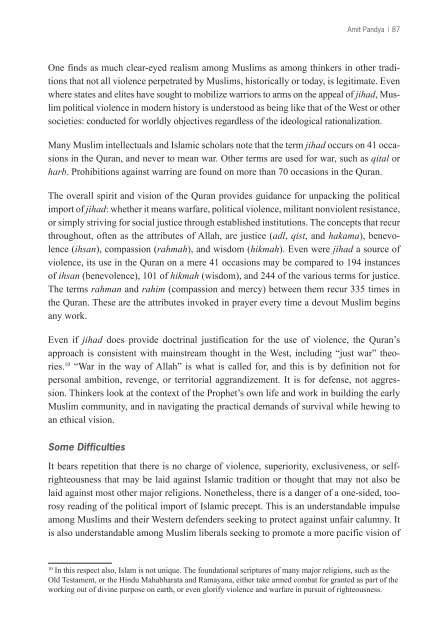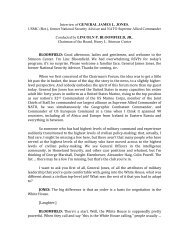Islam and Politics - The Stimson Center
Islam and Politics - The Stimson Center
Islam and Politics - The Stimson Center
Create successful ePaper yourself
Turn your PDF publications into a flip-book with our unique Google optimized e-Paper software.
Amit P<strong>and</strong>ya | 87<br />
One finds as much clear-eyed realism among Muslims as among thinkers in other traditions<br />
that not all violence perpetrated by Muslims, historically or today, is legitimate. Even<br />
where states <strong>and</strong> elites have sought to mobilize warriors to arms on the appeal of jihad, Muslim<br />
political violence in modern history is understood as being like that of the West or other<br />
societies: conducted for worldly objectives regardless of the ideological rationalization.<br />
Many Muslim intellectuals <strong>and</strong> <strong>Islam</strong>ic scholars note that the term jihad occurs on 41 occasions<br />
in the Quran, <strong>and</strong> never to mean war. Other terms are used for war, such as qital or<br />
harb. Prohibitions against warring are found on more than 70 occasions in the Quran.<br />
<strong>The</strong> overall spirit <strong>and</strong> vision of the Quran provides guidance for unpacking the political<br />
import of jihad: whether it means warfare, political violence, militant nonviolent resistance,<br />
or simply striving for social justice through established institutions. <strong>The</strong> concepts that recur<br />
throughout, often as the attributes of Allah, are justice (adl, qist, <strong>and</strong> hakama), benevolence<br />
(ihsan), compassion (rahmah), <strong>and</strong> wisdom (hikmah). Even were jihad a source of<br />
violence, its use in the Quran on a mere 41 occasions may be compared to 194 instances<br />
of ihsan (benevolence), 101 of hikmah (wisdom), <strong>and</strong> 244 of the various terms for justice.<br />
<strong>The</strong> terms rahman <strong>and</strong> rahim (compassion <strong>and</strong> mercy) between them recur 335 times in<br />
the Quran. <strong>The</strong>se are the attributes invoked in prayer every time a devout Muslim begins<br />
any work.<br />
Even if jihad does provide doctrinal justification for the use of violence, the Quran’s<br />
approach is consistent with mainstream thought in the West, including “just war” theories.<br />
10 “War in the way of Allah” is what is called for, <strong>and</strong> this is by definition not for<br />
personal ambition, revenge, or territorial aggr<strong>and</strong>izement. It is for defense, not aggression.<br />
Thinkers look at the context of the Prophet’s own life <strong>and</strong> work in building the early<br />
Muslim community, <strong>and</strong> in navigating the practical dem<strong>and</strong>s of survival while hewing to<br />
an ethical vision.<br />
Some Difficulties<br />
It bears repetition that there is no charge of violence, superiority, exclusiveness, or selfrighteousness<br />
that may be laid against <strong>Islam</strong>ic tradition or thought that may not also be<br />
laid against most other major religions. Nonetheless, there is a danger of a one-sided, toorosy<br />
reading of the political import of <strong>Islam</strong>ic precept. This is an underst<strong>and</strong>able impulse<br />
among Muslims <strong>and</strong> their Western defenders seeking to protect against unfair calumny. It<br />
is also underst<strong>and</strong>able among Muslim liberals seeking to promote a more pacific vision of<br />
10<br />
In this respect also, <strong>Islam</strong> is not unique. <strong>The</strong> foundational scriptures of many major religions, such as the<br />
Old Testament, or the Hindu Mahabharata <strong>and</strong> Ramayana, either take armed combat for granted as part of the<br />
working out of divine purpose on earth, or even glorify violence <strong>and</strong> warfare in pursuit of righteousness.

















